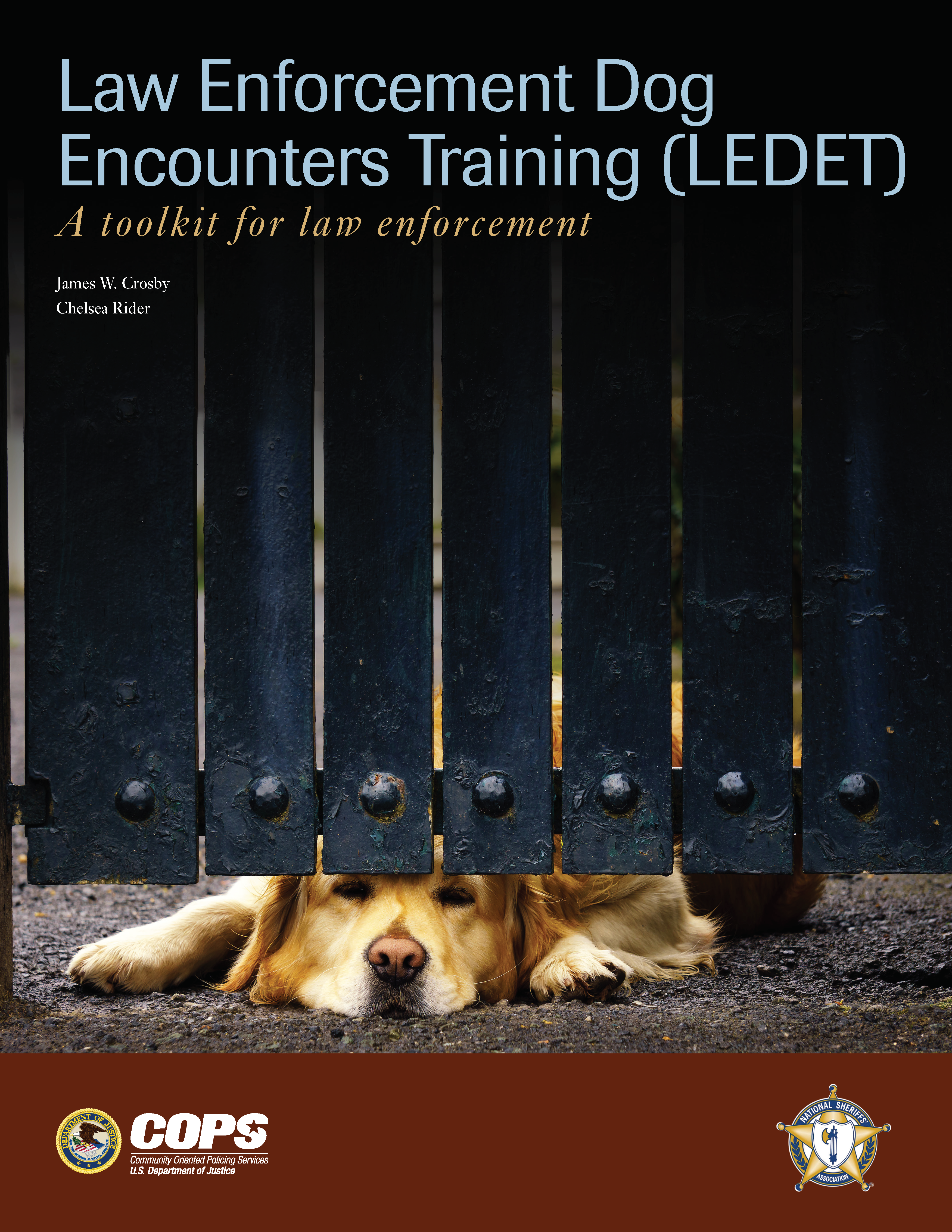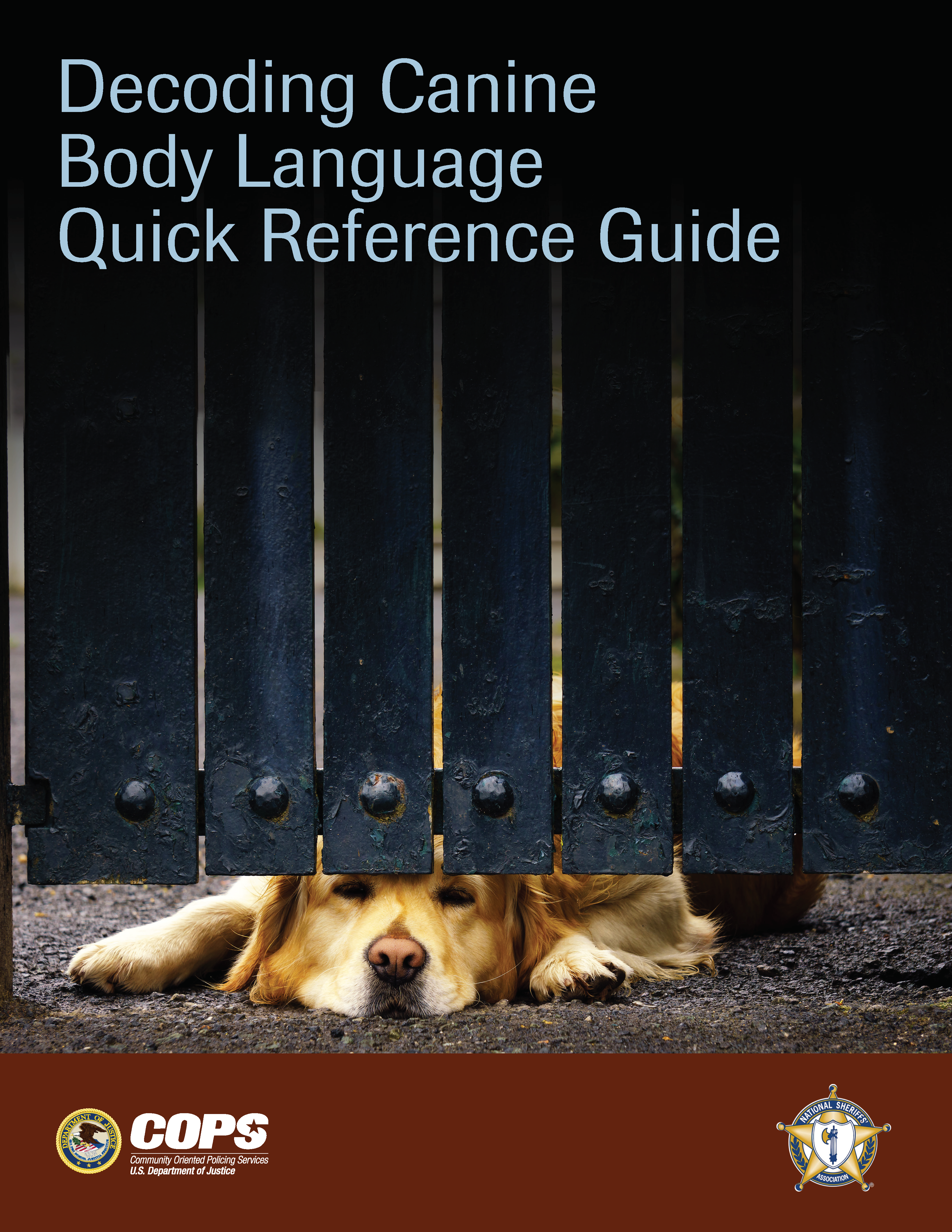Law Enforcement Dog Encounters Training (LEDET)
The use of force by law enforcement, deadly or otherwise, has become a major issue before the public. As human cases have become more visible, so have cases where law enforcement officers have used deadly force against companion dogs. The purpose of this toolkit is to provide law enforcement agencies and officers with the information, tools, and resources necessary to handle dog encounters, starting with prevention all the way through dealing with the aftermath of an unfortunate deadly dog encounter.
Click on the images below to access the LEDET Toolkit and Quick Reference Guide. Click here to learn more about the LEDET Curriculum, which will be released in 2020.
 |
 |
To learn more about our scenario-based virtual training program with VirTra, click here.
For More Information Contact:
Dr. James W. Crosby, M.S., PhD.
Canine Agression Consulting LLC
Email: canineagression@gmail.com
Phone: 904-476-7655
Additional Resources
Legislation:
- The General Patton Act of 2003 (Tennessee) - amends Tennessee Code Annotated § 38-8-116, but subsequent revisions have codified the training requirement in Tenn. Code Ann. § 38-8-117, Training in animal and canine behavior
- Dog Protection Act (Colorado) - signed into law in May 2013. The Act requires law enforcement officers to receive training on handling dog encounters while on duty [Colo. Rev. Stat. § 29-5-112(4) (2013)]
- Illinois Compiled Statutes – Illinois Police Training Act (Illinois) - also signed into law in 2013, the bill amended the Illinois Police Training Act to include both animal fighting awareness as well as humane response [50 Ill. Comp. Stat. § 705/10.14 (2013)]
- Canine Encounter Training Program (Texas) - On May 18, 2015, Texas Governor Gregg Abbott signed House Bill 593 into law. The law requires at least four hours of classroom and practical training in seven areas related to dog encounters for newly hired law enforcement officers [Tex. Occ. Code § 1701.261(a)(1)-(7) (2015)]
- Certification and Training: Peace Officers: Nevada Governor Brian Sandoval signed Senate Bill 147 into law on May 20, 2015, which directs the state law enforcement agencies to determine when a peace officer employed by that agency is required to be trained in effective responses to incidents involving dogs or where dogs are present. The bill outlined four areas of concentration for the training and commanded Nevada's Commission on Peace Officer Standards and Training to develop minimum standards for such training programs. [Nev. Rev. Stat. § 289.595 (2015)]
- House Bill 64 (Ohio) - Included in Ohio’s 2015 budget appropriations bill was a requirement that the Ohio Attorney General create rules that govern the training of Ohio peace officers on “companion animal encounters and companion animal behavior.” The requirement is codified in Ohio Revised Code § 109.747: Rules governing training of peace officers on companion animal encounters and companion animal behavior
- MODEL LEGISLATION: Humane Canine Response Training Act - if a state is interested in enacting similar legislation, the Animal Law Resource Center has created model legislation.
Model/Sample Policies:
- Georgia Association of Chiefs of Police - Standard Operating Procedure 11.6: Use of Force When Dealing with Animals
- Los Angeles Police Department - Use of Force Directive 7: Dog Encounters
- Austin Police Department – Policy 202: Firearms Discharge Situations - § 202.3.2: Reporting a Firearm Discharge against a Dangerous and Threatening Animal
- Chicago Police Department - General Order G03-02: Use of Force: Section III(C)(6): Use of Deadly Force: Necessary to Prevent Death or Great Bodily Harm
- Baltimore Police Department – Policy 1115: Use of Force (Page 6 of 14)
- Las Vegas Metropolitan Police Department - 6/002.00 USE OF FORCE and 5/109.01 POST USE OF FORCE PROCEDURES A.S. 26.1.1 (Pages 10, 22, and 28)
- Denver Sheriff’s Department – Department Order 5011: Use of Force Policy: Section 12: Use of Force on Animals (Pages 27-30)
Articles
- Courts are awarding significant damages to families whose dogs are killed by police [ABA Journal, April 2018]
- 700 dogs have been shot or shot at by police in Chicago in the past decade [Chicago Sun-Times, March 2018]
- What Dog Shootings Reveal About American Policing [The Atlantic, July 2017]
- How to keep your dog from being shot by police [The Daily Dot, Updated February 2017]
-
Collateral Damage: Police shooting dogs in line of duty [WGRZ, Updated November 2016]
- RELATED: As training expands, BPD shooting fewer dogs [WGRZ, November 2017]
- RELATED: On The Reporting Trail: When Police Shoot Dogs [WGRZ, May 2015]
- RELATED: Dog Shootings By Buffalo PD Dropped Since WGRZ Story [WGRZ, May 2015]
- Tools, training aim to curb dog fatalities
- Cops are Programmed to Kill and the Growing Epidemic of Police Shooting Dogs is Proof [The Free Thought Project, August 2016]
- Police Kill Nearly 25 Dogs Each Day [The Nation, July 2016]
- How some police departments are trying to prevent 'puppycide' [The Christian Science Monitor, June 2016]
- Cops shooting at dogs [The Washington Post, June 2015]
- Crossing the thin blue line [HSUS/Animal Sheltering, September/October 2014]
- Are police too quick on the draw against dogs? [The Chicago Tribune, August 2013]
Training
- Police and Dog Encounters: Tactical Strategies and Effective Tools to Keep Our Communities Safe and Humane
- Dealing with Dangerous Dogs (Verified Law Enforcement Only)
Position Statements:
- Dogs Shot by Cops: Companion Animals and Law Enforcement [ALDF]
- Position Statements on Law Enforcement Response to Potentially Dangerous Dogs [ASPCA]
This project was supported by cooperative agreement 2016-CK-WX-K032, awarded by the Office of Community Oriented Policing Services, U.S. Department of Justice. The opinions contained herein are those of the author(s) and do not necessarily represent the official position or policies of the U.S. Department of Justice. References to specific agencies, companies, products, or services should not be considered an endorsement by the author(s) or the U.S. Department of Justice. Rather, the references are illustrations to supplement discussion of the issues.



